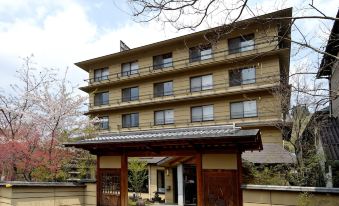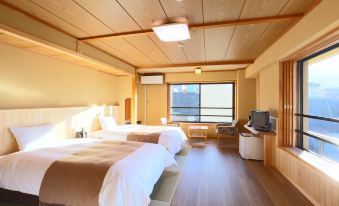Shibu Hotel(渋ホテル(shibu-hotel))
1 doba
Pokoje i goście
1 pokój, 2 osoby dorosłe, 0 dzieci
Wszystkie obiekty w: Yamanochi
Shibu Hotel
渋ホテル(shibu-hotel)
2173 Hirao, 381-0401 Yamanochi, Shimotakai District, Prefektura Nagano, Japonia
Pokaż na mapie
Położony w mieście Yamanouchi, Shibu Hotel jest tylko kawałek od miejsca takiego jak Shibu Onsen i 3 minut samochodem od atrakcji takiej jak Region narciarski Shiga Kogen. Ryokan znajduje się 2,7 km od atrakcji takiej jak Park małp Jigokudani i 10,4 km od miejsca takiego jak Ośrodek narciarski Maruike.Pokaż więcej
Wyrównujemy ceny







4.7/5Fantastyczny·Czystość: 4.7
Cała 42 ocena
Udogodnienia
Prywatny parkingGratisGorące źródłoPole golfoweNarciarstwoSpaPrzechowalnia bagażuRestauracjaUsługa odbioru ze stacjiGratisSala spotkańWi-Fi w strefach publicznych
Wszystkie udogodnienia
Otoczenie
Pociąg: Yudanaka Station
(1,8km)
Pociąg: Yomase Station
(4,9km)
Charakterystyczny obiekt: Shibu Onsen Nibanyu Kasanoyu
(<100m)
Mapa
Pokoje
Oceny gości
Zasady
Udogodnienia

14
Japanese-Style Room
5 Floor bedding
Non-smoking
Air conditioning
Private bathroom
Refrigerator
Minibar
Sprawdź dostępność

6
Superior Twin Room
2 Single bed
Non-smoking
Air conditioning
Refrigerator
Minibar
River view
Sprawdź dostępność

7
Deluxe Twin Room
2 Single bed
Non-smoking
Air conditioning
Refrigerator
Minibar
River view
Sprawdź dostępność

4
Basic Twin Room
2 Single bed
Non-smoking
Air conditioning
Refrigerator
Minibar
Towels
Sprawdź dostępność

5
Deluxe Twin Room
2 Single bed
Non-smoking
Air conditioning
Private bathroom
Refrigerator
Minibar
Sprawdź dostępność
![[No View]Western-Style Room (with Bath And Toilet) C[Twin Room][Non-Smoking]](http://ak-d.tripcdn.com/images/1re6m12000b87h4ih2D60_R_200_100_R5.webp)
2
[No View]Western-Style Room (with Bath And Toilet) C[Twin Room][Non-Smoking]
Non-smoking
Private bathroom
Sprawdź dostępność
Ukryj rodzaje pokoju
Oceny gości
4,7/5
Fantastyczny
42 – liczba opinii
 Zweryfikowane opinie
Zweryfikowane opinie- Czystość4,7
- Udogodnienia4,7
- Otoczenie4,7
- Obsługa4,7
Średnia podobnych obiektów w: Yamanochi

Churee W.
30 stycznia 2024 r.
We are very impressed with the hotel service.The hotel makes travel convenient and smooth.There are pick-up and drop-off fromYudanaka Station to the hotel and drop-off at Monkey onsen.The hotel is in the good location,in the heart of Shibu Onsen, beutiful view of the mountian and river in front.The beer, white and red wine in the refrigerator in the room are free.The onsen is not very big but clean.Dinner and breakfast are fresh and delicious. Shibu Hotel is a very good hotel,worth staying.
Przetłumacz

Vladislav
7 października 2024 r.
Очень вежливый и доброжелательный персонал в отеле, великолепный ужин в японском традиционном стиле, однако внутри отель немного староват и потрепан. Есть бесплатный трансфер, но следует договориться о нем заранее
Przetłumacz

Gość
18 maja 2024 r.

Wonderful experience staying here. Akiyoshi and his family and staff made us feel very welcome. The room was lovely, and the private onsen excellent. We are vegan, and the chef prepared fantastic meals for us. Our server (wish I could remember his name) was so friendly and helpful. Highly recommended.
Przetłumacz

Gość
21 kwietnia 2024 r.

This is the sixth time I have stayed here and it did not disappoint. The care demonstrated by Mr and Mrs Yamada left no need of the traveller unanswered. The rooms have recently been renovated and have very simple but very classy appointments. Beds are large and comfortable. Views of the stream are excellent. Yukata and geta allow for an authentic experience in the backstreets of onsen. Japanese food in general rarely disappoints but I’ve never had a better kaiseki dinner or their breakfast. Courtesy shuttle to and from station and Monkey Park is icing on the cake. I cannot fault Shibu Hotel
Przetłumacz

Gość
12 kwietnia 2024 r.

Fantastic stay at a beautiful family run Ryokan. Exceptional hospitality and the most amazing dinner and breakfast. We wanted to experience an old onsen town and were very happy with our choice in Yudanaka. They also offer a free shuttle to the nearby snow monkey park which was wonderful. I would highly recommend this lovely town and particularly Shibu hotel. I think it was very good value for money for the stay which not only included dinner and breakfast but also free drinks in the minibar and in the lobby area.
Przetłumacz

Gość
29 marca 2024 r.

If you plan to ski in Shiga Kogen and you’re wondering where to stay, you have to answer a first basic question: do you stay in a contemporary hotel up on the slopes, or down in the valley in a traditional Japanese ryokan with an onsen fed by natural hot springs? This review is a recommendation to go for the ryokan experience, and specifically for the Shibu Hotel in the village of Yudanaka. To understand the Shibu’s charms I’m prefacing my comments with what I think is important context and useful info. Shiga Kogen is a vast ski area of 18 interlinked resorts. The resorts are located on the slopes of the mountains at about 1400 meters (4600 ft). Many appear to have been built in the 1990s for the Nagano olympics. Many of them are ski in/out. We did not visit any of them, but as best we could tell there are few if any restaurants, bars or convenience stores that aren’t located inside a hotel. These are resorts. The resort experience is probably great. There are so many lifts and gondolas that we literally did not have to wait in line once. There are so many trails that we never felt crowded. There were even times we had an entire piste to ourselves from the summit at 2000 meters to the gondola station below. In five days skiing we managed to explore a fraction of the Shiga area. It’s fabulous. If all you want to do is shred, ski out at 8:30 and ski back in at 4:30, this is the place to do it. You can ski till you drop. But if you also want a bit of the Japanese cultural experience, you should stay in Yudanaka, an ancient little village built around the Shibu Onsen hot baths whose history goes back more than a thousand years to when it was the place for a bath and a rest for pilgrims on their way to the Zenkoji Temple. Yudanaka is the last stop on the Nagano Dentetsu electric rail line. The main village lane is a charming narrow street cobbled with small pavers and lined by traditional wooden ryokan and small stores (one converted to a free public table tennis hall), interspersed by skinny alleys that lead up the hillside to who knows where. There are also little restaurants -typically seating no more than a dozen people- next to shrines, old carved-stone, spring-fed foot baths and, of course, the onsen. There are nine onsen in Yudanaka. Each taps a different hot spring in the mountains above - each is said to deliver water with slightly different mineral properties, to treat different types of ailments. Some people buy a commemorative junyoku on which to collect a stamp from each onsen. All guests staying in the member-ryokans are welcome to use the onsen for free (non guests pay a small fee). So foreigners and Japanese both walk the village lane, wearing their yukata and geta, more about which later. These nine public onsen are maintained by a group of village ryokan owners. We stayed in one of these inns called the Shibu Hotel. It was one of the most charming travel experiences of our lives. Management of a ryokan
Przetłumacz

Gość
16 lutego 2024 r.

I recently stayed at Shibu Hotel in Yamanochi, Nagano, and it exceeded my expectations. The service was excellent, with a very helpful English-speaking staff. The complementary drinks in the room fridge and lobby were a nice touch. The rooms were clean and spacious, perfect for oversized luggages The free shuttle to the snow monkey park and Yamaneda Train Station was convenient. Access to public onsens added to the overall experience. They also provide a Yukata that you can use. Just a tip: book in-house meals in advance to avoid missing out as they tend to fill up quickly. Overall a highly recommended stay.
Przetłumacz

Gość
9 lutego 2024 r.

My partner and I stayed here in February 2024 in order to see the snow monkeys. The service was fantastic, especially the shuttle services from the station and to the snow monkey park. The food was authentic Japanese, incredibly well done. We would thoroughly recommend. Thank you so much!
Przetłumacz

JY3ZB
15 stycznia 2024 r.

I cannot say enough good things about Shibu Hotel! First and foremost, we forgot an important item at the hotel and they had it messengered to our next hotel in Tokyo, arriving the following morning (which also happened to be the day we leaving Japan). The front desk / hotel staff was incredible as well as the restaurant staff. The traditional Japanese meals were fantastic (and very filling!). The onsens are great (and nicer than the public onsens, but they're also worth going to). If you're going to Yaganouchi, you need to stay here!
Przetłumacz
Regulamin obiektu
Godziny zameldowania i wymeldowania
Zameldowanie: po 15:00
Wymeldowanie: przed 11:00
Godziny pracy recepcji: [pn-nd]10:00–20:00
Zasady dotyczące dzieci
Dzieci od 1. roku życia mogą przebywać w niektórych typach pokoi w tym hotelu
Za dzieci korzystające z łóżek dostępnych w pokoju mogą obowiązywać dodatkowe opłaty. Podaj liczbę dzieci, aby uzyskać dokładniejszą cenę.
Łóżeczka niemowlęce i dodatkowe łóżka
Zasady dodatkowych łóżek zależą od rodzaju pokoju. Zapoznaj się z zasadami wybranego pokoju. Poproś hotel o szczegółowe informacje na temat zasad łóżeczek niemowlęcych.
Śniadanie
TypAsian
| Wiek | Opłata |
|---|---|
Dorosły | Skontaktuj się z hotelem |
Opłata za dodatkowe śniadanie nie jest wliczona w cenę i należy ją uiścić oddzielnie w obiekcie.
Pokaż więcej
Opis obiektu
- Otwarte:1995
- Liczba pokoi:13
Położony w mieście Yamanouchi, Shibu Hotel jest tylko kawałek od miejsca takiego jak Shibu Onsen i 3 minut samochodem od atrakcji takiej jak Region narciarski Shiga Kogen. Ryokan znajduje się 2,7 km od atrakcji takiej jak Park małp Jigokudani i 10,4 km od miejsca takiego jak Ośrodek narciarski Maruike.
Dostępne udogodnienia rekreacyjne to gorące źródła i wanna spa. Ten ryokan oferuje udogodnienia takie jak bezpłatny bezprzewodowy dostęp do internetu, sklepy z pamiątkami i czasopismami i pomoc w organizacji biletów/wycieczek.
Apetyt gości obiektu Shibu Hotel zaspokoi restauracja. Śniadanie japońskie jest podawane codziennie od 7 do 9 za opłatą.
Udogodnienia biznesowe to bezpłatny przewodowy dostęp do internetu, przechowalnia bagażu oraz sejf w recepcji. Bezpłatne udogodnienia to odbiór gości z dworca kolejowego. Dostępna jest także taka usługa jak bezpłatne parkowanie samodzielne.
Poczuj się jak w domu w 20 pokojach, których wyposażenie to lodówka i bezpłatny minibar. Wyposażenie łóżek to kołdry puchowe i pościel premium. Bezpłatny bezprzewodowy dostęp do internetu zapewni łączność ze światem, a 26-cal. telewizor LCD i telewizja cyfrowa — rozrywkę. Prywatna łazienka — wyposażenie: wanny lub prysznice, bezpłatne przybory toaletowe i suszarki do włosów.
Dostępne udogodnienia rekreacyjne to gorące źródła i wanna spa. Ten ryokan oferuje udogodnienia takie jak bezpłatny bezprzewodowy dostęp do internetu, sklepy z pamiątkami i czasopismami i pomoc w organizacji biletów/wycieczek.
Apetyt gości obiektu Shibu Hotel zaspokoi restauracja. Śniadanie japońskie jest podawane codziennie od 7 do 9 za opłatą.
Udogodnienia biznesowe to bezpłatny przewodowy dostęp do internetu, przechowalnia bagażu oraz sejf w recepcji. Bezpłatne udogodnienia to odbiór gości z dworca kolejowego. Dostępna jest także taka usługa jak bezpłatne parkowanie samodzielne.
Poczuj się jak w domu w 20 pokojach, których wyposażenie to lodówka i bezpłatny minibar. Wyposażenie łóżek to kołdry puchowe i pościel premium. Bezpłatny bezprzewodowy dostęp do internetu zapewni łączność ze światem, a 26-cal. telewizor LCD i telewizja cyfrowa — rozrywkę. Prywatna łazienka — wyposażenie: wanny lub prysznice, bezpłatne przybory toaletowe i suszarki do włosów.
Udogodnienia
Popularne obiekty dla podróżujących w celach biznesowych
Prywatny parkingGratis
Gorące źródło
Pole golfowePoza obiektem
NarciarstwoPoza obiektem
Spa
Przechowalnia bagażu
Restauracja
Usługa odbioru ze stacjiGratis
Sala spotkańDodatkowa opłata
Wi-Fi w strefach publicznych

Gorące źródło

Spa

Restauracja
Restauracja
Restauracja
Brak dodatkowych informacji
Pokaż więcej